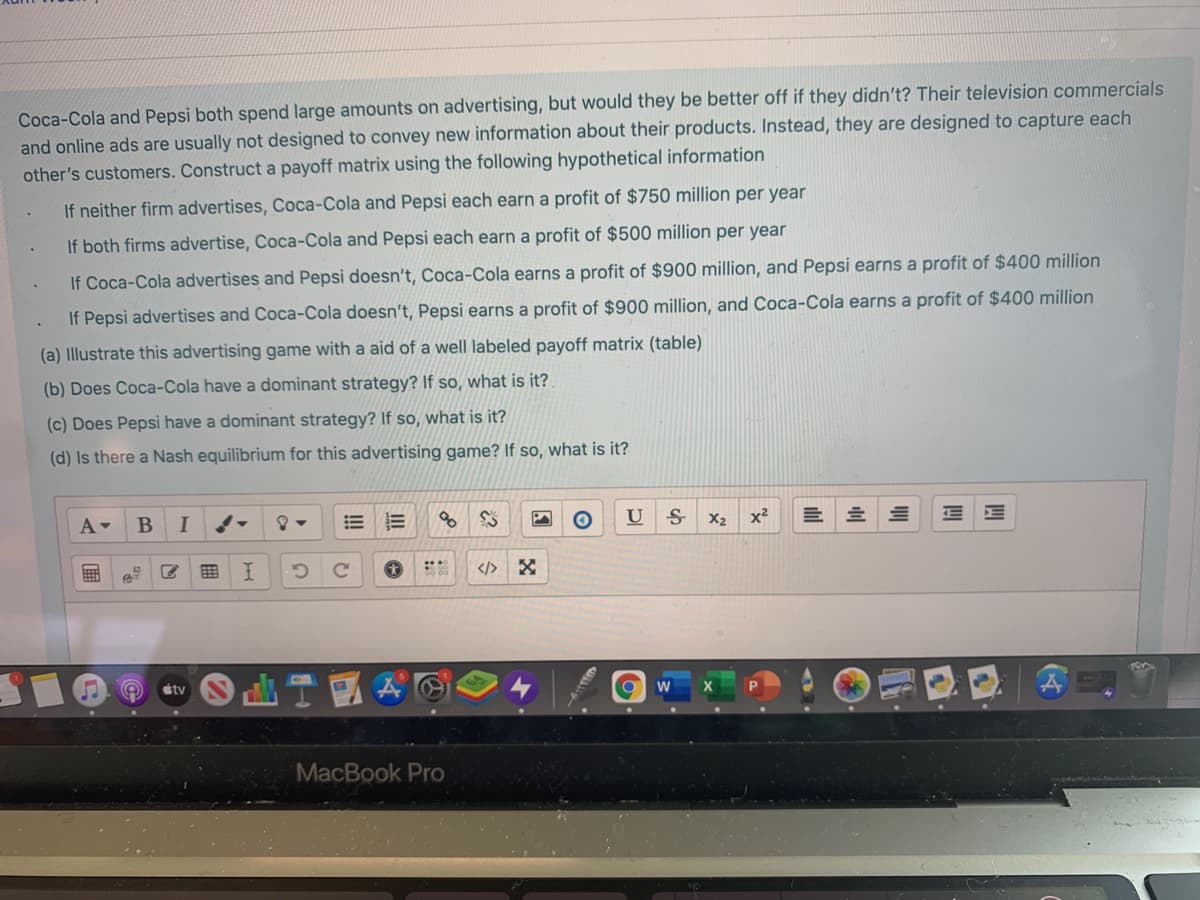Coca-Cola and Pepsi both spend large amounts on advertising, but would they be better off if they didn't? Their television commercials and online ads are usually not designed to convey new information about their products. Instead, they are designed to capture each other's customers. Construct a payoff matrix using the following hypothetical information If neither firm advertises, Coca-Cola and Pepsi each earn a profit of $750 million per year If both firms advertise, Coca-Cola and Pepsi each earn a profit of $500 million per year If Coca-Cola advertises and Pepsi doesn't, Coca-Cola earns a profit of $900 million, and Pepsi earns a profit of $400 million If Pepsi advertises and Coca-Cola doesn't, Pepsi earns a profit of $900 million, and Coca-Cola earns a profit of $400 million (a) Illustrate this advertising game with a aid of a well labeled payoff matrix (table) (b) Does Coca-Cola have a dominant strategy? If so, what is it?
Coca-Cola and Pepsi both spend large amounts on advertising, but would they be better off if they didn't? Their television commercials and online ads are usually not designed to convey new information about their products. Instead, they are designed to capture each other's customers. Construct a payoff matrix using the following hypothetical information If neither firm advertises, Coca-Cola and Pepsi each earn a profit of $750 million per year If both firms advertise, Coca-Cola and Pepsi each earn a profit of $500 million per year If Coca-Cola advertises and Pepsi doesn't, Coca-Cola earns a profit of $900 million, and Pepsi earns a profit of $400 million If Pepsi advertises and Coca-Cola doesn't, Pepsi earns a profit of $900 million, and Coca-Cola earns a profit of $400 million (a) Illustrate this advertising game with a aid of a well labeled payoff matrix (table) (b) Does Coca-Cola have a dominant strategy? If so, what is it?
Managerial Economics: Applications, Strategies and Tactics (MindTap Course List)
14th Edition
ISBN:9781305506381
Author:James R. McGuigan, R. Charles Moyer, Frederick H.deB. Harris
Publisher:James R. McGuigan, R. Charles Moyer, Frederick H.deB. Harris
Chapter13: best-practice Tactics: Game Theory
Section: Chapter Questions
Problem 1E
Related questions
Question

Transcribed Image Text:Coca-Cola and Pepsi both spend large amounts on advertising, but would they be better off if they didn't? Their television commercials
and online ads are usually not designed to convey new information about their products. Instead, they are designed to capture each
other's customers. Construct a payoff matrix using the following hypothetical information
If neither firm advertises, Coca-Cola and Pepsi each earn a profit of $750 million per year
If both firms advertise, Coca-Cola and Pepsi each earn a profit of $500 million per year
If Coca-Cola advertises and Pepsi doesn't, Coca-Cola earns a profit of $900 million, and Pepsi earns a profit of $400 million
If Pepsi advertises and Coca-Cola doesn't, Pepsi earns a profit of $900 million, and Coca-Cola earns a profit of $400 million
(a) Illustrate this advertising game with a aid of a well labeled payoff matrix (table)
(b) Does Coca-Cola have a dominant strategy? If so, what is it?
(c) Does Pepsi have a dominant strategy? If so, what is it?
(d) Is there a Nash equilibrium for this advertising game? If so, what is it?
A-
U
X2
x²
</>
stv
X
P
MacBook Pro
Expert Solution
This question has been solved!
Explore an expertly crafted, step-by-step solution for a thorough understanding of key concepts.
This is a popular solution!
Trending now
This is a popular solution!
Step by step
Solved in 2 steps

Knowledge Booster
Learn more about
Need a deep-dive on the concept behind this application? Look no further. Learn more about this topic, economics and related others by exploring similar questions and additional content below.Recommended textbooks for you

Managerial Economics: Applications, Strategies an…
Economics
ISBN:
9781305506381
Author:
James R. McGuigan, R. Charles Moyer, Frederick H.deB. Harris
Publisher:
Cengage Learning

Managerial Economics: A Problem Solving Approach
Economics
ISBN:
9781337106665
Author:
Luke M. Froeb, Brian T. McCann, Michael R. Ward, Mike Shor
Publisher:
Cengage Learning


Managerial Economics: Applications, Strategies an…
Economics
ISBN:
9781305506381
Author:
James R. McGuigan, R. Charles Moyer, Frederick H.deB. Harris
Publisher:
Cengage Learning

Managerial Economics: A Problem Solving Approach
Economics
ISBN:
9781337106665
Author:
Luke M. Froeb, Brian T. McCann, Michael R. Ward, Mike Shor
Publisher:
Cengage Learning



Exploring Economics
Economics
ISBN:
9781544336329
Author:
Robert L. Sexton
Publisher:
SAGE Publications, Inc

Economics: Private and Public Choice (MindTap Cou…
Economics
ISBN:
9781305506725
Author:
James D. Gwartney, Richard L. Stroup, Russell S. Sobel, David A. Macpherson
Publisher:
Cengage Learning